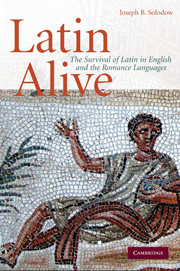Book contents
- Frontmatter
- Contents
- List of Maps
- Acknowledgments
- 1 Introduction
- PART ONE LATIN
- PART TWO THE ROMANCE VOCABULARY
- PART THREE PROTO-ROMANCE, OR WHAT THE LANGUAGES SHARE
- PART FOUR EARLIEST TEXTS AND FUTURE DIRECTIONS, OR WHERE THE LANGUAGES DIVERGE
- Suggestions for Further Reading
- General Index
- Index of English Words
1 - Introduction
English Is Not a Cousin to the Romance Languages, But …
Published online by Cambridge University Press: 05 June 2012
- Frontmatter
- Contents
- List of Maps
- Acknowledgments
- 1 Introduction
- PART ONE LATIN
- PART TWO THE ROMANCE VOCABULARY
- PART THREE PROTO-ROMANCE, OR WHAT THE LANGUAGES SHARE
- PART FOUR EARLIEST TEXTS AND FUTURE DIRECTIONS, OR WHERE THE LANGUAGES DIVERGE
- Suggestions for Further Reading
- General Index
- Index of English Words
Summary
This book recounts the fascinating story of how Latin became the modern Romance languages, and it does so for readers who know no language other than English. Such readers, perhaps to their surprise, will be able to follow the story easily, in part because each mention of another language is explained or translated, but chiefly because so much of the story is reflected in English itself.
Latin, the tongue of the ancient Romans, is the direct ancestor and, so to speak, sole parent of a host of languages spoken around the world today. Far from being a dead language, it lives on in them (and in English too) as substantially as our forebears, whose genetic material shapes us, live on in us. The two thousand years that separate the one language from the others have witnessed both remarkable persistence and dramatic, even revolutionary, changes, which raises the question: how is it that the current languages are so similar to Latin and yet so different from it? The notable variations among the current languages are another source of interest: how did it happen that, starting out from the same place, they – French, Italian, and Spanish, in particular – have arrived at such separate destinies? This tale is an entrancing saga, played out against the background of western European history and culture: which historical and linguistic forces, we may wonder, have shaped and driven it?
- Type
- Chapter
- Information
- Latin AliveThe Survival of Latin in English and the Romance Languages, pp. 1 - 6Publisher: Cambridge University PressPrint publication year: 2010



